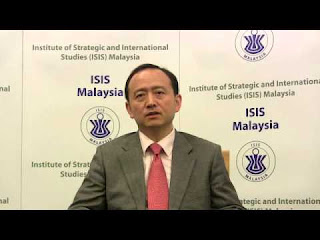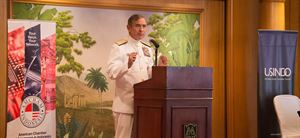The source from Honorable Tung Chee Hwa, First Governor of Hongkong Special Administrative to China. (1997 - 2002) He has recently spoken on Asian Society in NewYork, June 2017 that
China US Relationship was anchored Interdependent Relation, Trade and Good growth. Investment US to China. People to people exchange growth.
Mr. Honorable Tung has given proven track record where China in 1947 to today about 600 Million people in China is lifted of poverty. Life expectant 35 to 76 years old. Infant mortality is drop to 20 % to 9% and illiteracy language and Education is 80% to 20%. Six Hundreds millions people has been lifted up of poverty. Essential Infrastructure an Education has been built. China GDP is US$8000 still rank among developing country. Chan has not intention to hegemonic or ideological ambition but to pursue peace and prosperity among her neighbors. China does not need to impose the value to other nations and hegemonic aggression is not on the DNA of Chinese people. Since the Ming Dinasty where China has 30% GDP china empire and expansion never to colonize the territories of others. To Chinese People Peace is above the All. China Military expansion is only for defense purposes and Military expenditure at below 2% GDP comparatively low to any standard. (Video his speak at Asia Society June 2017)
Transition to a new world order with more diffuse distribution of economic power is under way. This first edition of a new World Bank flagship report, 'Global Development Horizons 2011', focuses on three major international economic trends: the shift in the balance of global growth from developed to emerging economies, the rise of emerging-market firms as a force in global business, and the evolution of the international monetary system toward a multicurrency regime.
Pursuit of growth opportunities on a global level has meant that the international presence of emerging-market firms in cross-border production, trade, and finance has been on the rise for some time. Emerging and developing counties accounted for 46 percent of international trade flows in 2010, up from 30 percent in 1995. Cross-border mergers and acquisitions originated by firms based in emerging markets represent nearly one-third of global M and A transactions. The risk of investing in emerging economies has declined dramatically, while emerging economies’ financial assets and wealth have expanded: emerging and developing countries now hold three-fourth of all official foreign exchange reserves.
Despite the large, rapidly growing size of emerging economies and the expanding international presence of emerging-market firms, the role of emerging economies in the international monetary system remains relatively insignificant. No emerging-market currency is used to a great extent in holding official reserves, invoicing goods and services, denominating international claims, or anchoring exchange rates. Virtually all developing countries are exposed to currency mismatch risk in their international trade, investment, and financing transactions. But it appears that this too will change in the coming years. Smoothing the transition to a multipolar monetary environment will be high on the agenda of policy makers, who will face major decisions about whether fundamental reform of the rules of the international monetary system is in order.
The first edition of 'Global Development Horizons' consists of a hard-copy publication and a companion website (http://www.worldbank.org/GDH2011), the latter of which will include the report’s underlying data and methodology, blog postings, and background papers and will incorporate an interactive feature allowing users to explore the scenarios described in GDH 2011. In the future, the site will continue to contribute to international discourse on multipolarity by serving as a repository for related research papers and as a platform for interactive debate among academic, policy, and business institutions concerned with long-term global economic change and its implications for development policy.
Essay from the year 2011 in the subject Economics - International Economic Relations, grade: 2,
Heriot-Watt University Edinburgh, language: English, abstract: The aim of this paper is to outline how the rise of China is re-shaping the business environment for multi-national enterprises (MNEs) and how this is affecting their businesses. The aggrandisement of China to become the second-largest economy in the world occurred already in 2010 and this year it has been estimated that the People’s Republic of China will outrun the United States of America as the biggest manufacturer (Hout and Ghemawat, 2010, p.95). Due to their economic power, the Chinese government is also gaining more political power, which shows the willingness of China to contribute to the Eurozone’s bailout fund (Anderlini, 2011a). Moreover, this shows the significance China has as an economic region for the MNEs. Although the initial approach was primarily to get access to low-wages labour in order to economise the manufacturer cost, this has recently experienced an enormous turnaround. Many enterprises no longer just seek the advantages of low-labour cost in China, but to a greater extent MNEs emphasise the “purchasing power [which] continues to increase [and so] their population is becoming important consumer markets as well” (Cavusgil, Ghauri and Agarwal, 2002, p.2). At the same time China has been undergoing a movement towards a new stage of development. A shifting from a successful low- and middle-tech manufacturing economy to a sophisticated high-tech one has been seen and, as Hout and Ghemawat put it, this has been achieved “by cajoling, co-opting and often coercing Western and Japanese businesses” (2010, p.96). Even though China seems to offer a great opportunity for MNEs to produce and to sell their products, still the MNEs are facing huge challenges due to the provisions of national law.
The deals with globalisation and its effects on society and how it affects individuals and its effects on population, health, diseases, markets, economy and world trade
.


